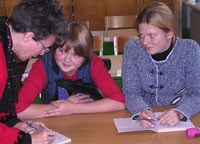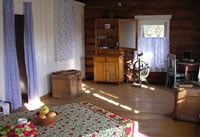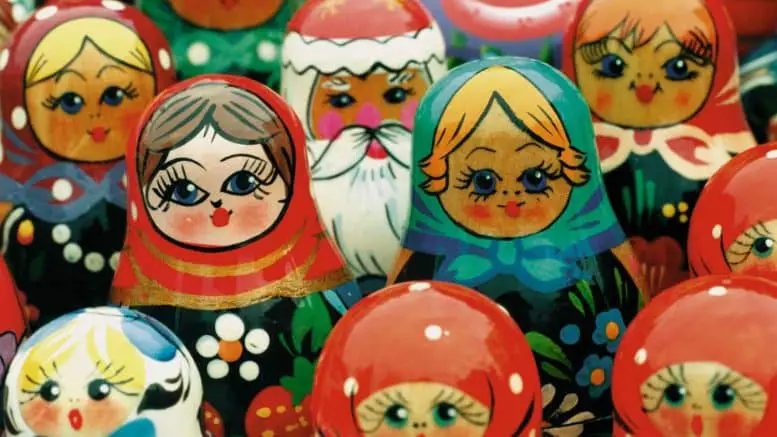After almost a decade of living and working in Russian villages, there are three questions that haunt us. First, how was the enormity of good that can be found in these villages so successfully hidden from Americans during the Cold War? Second, how was the good that can be found in America hidden from Russians? Third, what haven’t we learned in the last decade–given all we could accomplish together and haven’t?
When opinions swirl as to who, or what, is to blame for the present state of “non-relations” between our countries (the “Cold Peace” as many now call it), we turn back to our experience to keep from being discouraged. Our efforts to get people in America and Russia working together are neither political, commercial, nor religious. We work together at life itself. And it is the good we have experienced together that has given us the conviction that there is much our nations can achieve side-by-side.
We believe our countries have accomplished far less than they could have in the last decade because, while incredible amounts of money and effort have been put into building commercial ties, an equal amount of effort has not been given to establishing relations that are sympathetic and humane. Until we earn each other’s trust, let us work at giving each other a bit of humanity. It is sharing the best of life – the things that feed the soul which Russians so dearly love – that create bonds that outlast the disagreements and differences. As Desmond Tutu said at the founding ceremony of The Elders, “Despite all the ghastliness that is around, human beings are made for goodness.”

Jeannie Ferber with two students in a Russian village.
While our work in Russia began by putting new books into village school libraries, it was obvious that much more could be done – even by an organization as small as ours. We realized that if our work was to have an effect, we had to give a voice and a face to the good our respective countries have to offer so that we would not become enemies once again by an ignorance, or denial, of that good. The point is not just to avoid another Cold War. It is to stop losing the good. Tapping into the good has allowed our organization to accomplish all that it has. Drawing on the good has gone farther than the money in our bank account could, and has produced results that have been more far reaching than anything we could have planned.
Take this one experience for example: for years a small television station in Ekaterinburg asked if it could do a human interest story on my love for the villages. Year after year we agreed simply because it was clear they were after something purely innocent and good. Finally, two years ago when Zhenya finished directing the clips of me milking the cows and weeding the potato patch, she announced that they wanted to end the story with something more serious. Would I type some short message on our laptop “to the Russian people?” As the camera filmed away, we all understood that such are the opportunities that can make a difference. Some two months after the story aired, Nikolai’s phone began ringing off the hook one day from friends not only in the Urals, but in Moscow, St. Petersburg, Surgut, Belograd and Blagoveshchensk in the Far East. The story had been somehow discovered by Первый Канал (Channel 1) and aired two consecutive weeks on nationwide television.
A similar opportunity happened again this year, but under very different circumstances. On arriving in Russia this fall I was, for whatever reason, conscious of how the ill-will toward America had grown over my years of working in Russia. The fact that a positive view of the U.S. rarely appears on the news was inevitably bound to have a cumlative effect but, nonetheless, the unfortunate comments about America that were popping up in conversations were a sad, new phenomenon. It was clear that the increasingly negative relations between our governments—a tendency I had previously viewed as merely a political problem—was more than that. It was beginning to replace my friends’ first hand knowledge of the good with the narrowest views of America. Thus, the following opportunity meant much to us for the sheer normalcy and thoughtfulness it represented.
Our work this time was to launch several projects in commemoration of the 200th anniversary of diplomatic ties between Russia and the United States. In conjunction with those projects, we were approached by Tелеканал Евразия(Television Eurasia) in Pervouralsk, asking if I would be willing to be the guest on a live half-hour talk show called “Здравый Смысл” or “Common Sense.” The first half was to be a discussion with the host and the second half, fielding questions from viewers. We agreed but, given the more strained political atmosphere, I asked if I could talk with the host before the show began. In that short time together I appealed to the good in him. And like any normal person, he responded. The entire show dealt with genuinely thoughtful issues. When I returned to the U.S. and watched a tape of the program, I was even more amazed at the generosity of spirit that had been expressed by both the host and the viewers calling in. Very briefly, for instance, I was asked what three elements I considered essential to American society? My answer touched on the strengths of democracy, freedom, and religion. Were those things essential to Russian society, the host continued? They were needed to preserve a higher humanity, I replied, and were not dependent on nationality. Even his questions about the great differences between our countries were not contentious. It gave the opportunity to suggest that it would be a mistake to count the differences as being more important than the good we can know together. At that point the discussion was no longer formal. He was clearly interested in the questions he was asking. “Can knowing the good of each other really make a difference? Do you really feel that can outweigh political strife?”
The obvious “yes” to those questions was also the answer as to why we, personally, need to take care of our relations with other nations. If we do not build those relations, politics will build them for us. There is a freedom that ordinary people have that neither politicians nor businessmen have — for they are under constant pressure to show immediate results and most often work within strained contexts. Relationships formed by ordinary people can arise from a pure desire to know one another. Even more, there is an equality to such relations. Both sides recognize they can enrich the other–and it is such relations that have long preserved our humanity even in the midst of political strife.
This was powerfully shown to me in the home I was given several years ago in Mycy, a village in the Kirov region where we had done our first library project. The real reason, we could only assume, for the amazing gift, was not for what we had done, but how we had done it. We had come and gone quickly, without fanfare, press coverage, or speeches. However, following the library project we patiently worked to build bridges between students and families here and there; bridges that allowed both sides to give.

The “American Home” in Mycy.
The home in Mycy, while presented to me, was obviously the villagers’ only way to give it to all who had helped make our work possible. The residents knew that the home was nothing compared to what most Americans live in, but they nonetheless did all they could, scrubbing the floors, filling the rooms with furniture from their attics, and hanging fresh curtains in the windows. Yet the home wasn’t their real gift. The real gift was the friendship and trust they were extending to Americans, who would then always have a place to stay in the small village.
The times I’ve spent in Myсy have changed me for life – so touched have I been by the deep understanding of life I have found there. Yet until we begin to value the things that money cannot buy, the wisdom, integrity, and unselfishness with which we help each other live better lives, we will have little motivation to seek what Russia, and other nations, have to give us.
Perhaps no American has done more in bringing this point to light than Greg Mortenson in his book Three Cups of Tea. He states that you have to have time for the third cup of tea in human relations – and an understanding of why that third cup is so vital. If a lack of recognition of what Russia has to give us has hindered our nations’ success in working together, it is not just an ignorance of the talents to be found there. It is an ignorance of the worth of the relationship itself. As President Dwight Eisenhower once said, “If we are going to take advantage of the assumption that all people want peace, then the problem is for people to get together and to lead governments – if necessary to evade governments – to work out not one method but thousands of methods by which people can gradually learn a little bit more of each other.”
For the sake of anticipating the question, “What specifically can Russia give us?” I will list a few specifics. However, such lists are ultimately as lifeless as answering what Bach gave to the world with a typed list of sonatas.
We could benefit from learning more about the high level of education in Russia and how they generally breed such a love of learning in children. Also, the Russian tradition of respect would greatly enrich our society, from improving family relations, to teacher-student relations and business relations. The Russian respect for elders, in particular, and the care family members give to elders is enviable. When extended families live under one roof it is not without challenges, but from that comes an added dignity to society. Young people learn from the experience of their grandparents, while giving their grandparnets a real sense of life and purpose. Inseparable from that respect, is the Russian ability to use direct language without offending each other. That quality does much to avoid deception and misunderstanding.
The contributions of Russian authors, artists and musicians have long left their mark on the world. Far less known are Russia’s Halls of Culture. They are the pride not only of big cities, but the smallest villages, having long supplied communities with the best of Russian and western art. Seeing these Halls of Culture has brought the most reaction from American audiences viewing our new documentary. People have been taken aback that such cultural heights were nurtured under communism. While the Halls of Culture were clearly designed to win the people’s devotion, they nonetheless produced a society that understood the elevating influence and necessity of literature, theatre, music, and art.
We have no desire to convince anyone of anything. Our work is merely to share the good we have met on every journey and at every turn. The point is not to take lightly the role you can play in tapping into the good and making it known. People unfamiliar with a Russia other than that of stereotypes and political propaganda will go on assuming that our countries cannot work together. Despite the atrocities that were committed under communism, and the tragedies that have been justified in the name of democracy, is there not immense wisdom in making the good of nations known so that the good may be strengthened and the evil disdained? The point dawns slowly that there is no life without the good, and until we discover the good, we do not truly know life or one another. And that is the only reason for this Cold.
The author of this article, Jeannie Ferber, co-founded Access to Ideas with Nikolai Arzhannikov. The not-for-profit supplies Russian village schools with new library books, while developing programs that allow people in America and Russia to take part in each other’s lives. Arzhannikov was a member of the Duma under President Yeltsin and founder of the Committee for Human Rights. Ferber is a writer and book publisher. Access to Ideas has just released a documentary on Russia from which many of the ideas in this article are taken. Those interested in seeing the documentary can learn more by visiting the Access to Ideas website.


